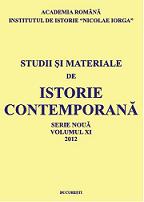Evoluţia istoriografiei în RFG (1949-1990): tradiţie, inovaţie şi
căutarea normalităţii
The evolution of historiography in FRG (1949-1990): tradition,
innovation and the quest for normality
Author(s): Raul DenizeSubject(s): History
Published by: Institutul de Istorie Nicolae Iorga
Keywords: Historiography; Federal Republic of Germany; Social sciences, Bielefeld School; Women’s history; Historikerstreit.
Summary/Abstract: This study presents the evolution of historiography in the Federal Republic of Germany between 1949 and 1990. Immediately after the war, the vast majority of German historians believed that the country’s future lay alongside the western democracies. As such, one of their main objectives became distancing themselves from their national-socialist past, leading important historians to emphasize the European dimension of national-socialism. The historical guild (Zunft) became dominated by conservative historians, who limited methodological and thematic innovation. Eventually, a series of new historical institutions emerged, but only starting with the 60’s did West-German historiography truly begin to follow a new course. The publication of Fritz Fischer’s 1961 book Griff nach der Weltmacht: die Kriegszielpolitik des Kaiserlichen Deutschland, 1914–18 greatly influenced a young generation of German historians who adopted a much more critical stance regarding the German national past. Later, the 70’s and 80’s were characterised by important innovations, such as the „historical social science” of the Bielefeld School which revolutionized the study of history, as well as the emergence of workshops all around the Federal Republic which made history more accessible to a „lay” audience. Women’s history received a lot of attention from renowned historians like Karin Hausen, Heide Wunder, Regina Schulte etc. The interaction of history with other social sciences and the ideas of Clifford Geerts, Natalie Zemon Davis, Hayden White etc. were well received. Finally, if the late 1980’s were dominated by the famous Historikerstreit and ideas of postnationalism, the Reunification of 1990 made the nation-state reappear on the agenda and „normality” became the word of the hour.
Journal: Studii şi materiale de istorie contemporană (SMIC)
- Issue Year: 2012
- Issue No: 1
- Page Range: 181-194
- Page Count: 14
- Language: Romanian
- Content File-PDF

